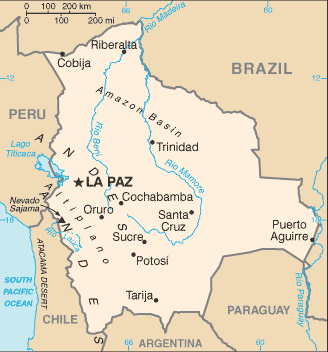 Bolivian President Evo Morales on Christmas Eve pardoned 1,800 prisoners held in facilities across the country—part of his ongoing effort to curtail overcrowding in the Andean nation's penal system. "The present decree's aim is to give amnesty and total or partial pardons to people who have been deprived of their liberty," Morales told a news conference in the central region of Cochabamba.
Bolivian President Evo Morales on Christmas Eve pardoned 1,800 prisoners held in facilities across the country—part of his ongoing effort to curtail overcrowding in the Andean nation's penal system. "The present decree's aim is to give amnesty and total or partial pardons to people who have been deprived of their liberty," Morales told a news conference in the central region of Cochabamba.
Those pardoned include inmates with sentences of less than five years, one-time offenders, prisoners under the age of 28, single mothers with children (generally incarcerated along with them), prisoners with terminal illnesses, and some with disabilities. Since those convicted of violent crimes and trafficking were excluded, the majority were almost certainly low-level drug offenders. This is the fourth time Morales has decreed such mass pardons.
It is estimated that 15,000 individuals remain incarcerated in Bolivia, with a population of 10 million. And a third of these have not actually been sentenced.
A November report by the Cochabamba-based Andean Information Network warned that prison overcrowding is at critical levels in Bolivia. The prison system has well surpassed 250% of total capacity, the report warned. It finds that Bolivia has the fifth worst over-crowding situation in Latin America after Haiti, El Salvador, Guatemala and Venezuela. Much of the blame is placed with Bolivia's widespread use of pre-trial detention—the country is found to have Latin America's second-highest rate of this practice after El Salvador. Bolivia's prison population has nearly doubled since 2008—with some some 20% of those incarcerated during this period having been convicted on drug-related charges.
While the pardons are an encouraging step, the problems they are meant to address are deeply entrenched across the region. Such factors have led to a growing wave of prison violence throughout Latin America.
Cross-post to High Times
Graphic: Perry-Castañeda Library Map Collection







Recent comments
2 weeks 12 hours ago
2 weeks 19 hours ago
5 weeks 1 day ago
6 weeks 19 hours ago
10 weeks 1 day ago
13 weeks 6 days ago
17 weeks 6 days ago
18 weeks 5 days ago
28 weeks 5 days ago
32 weeks 5 days ago